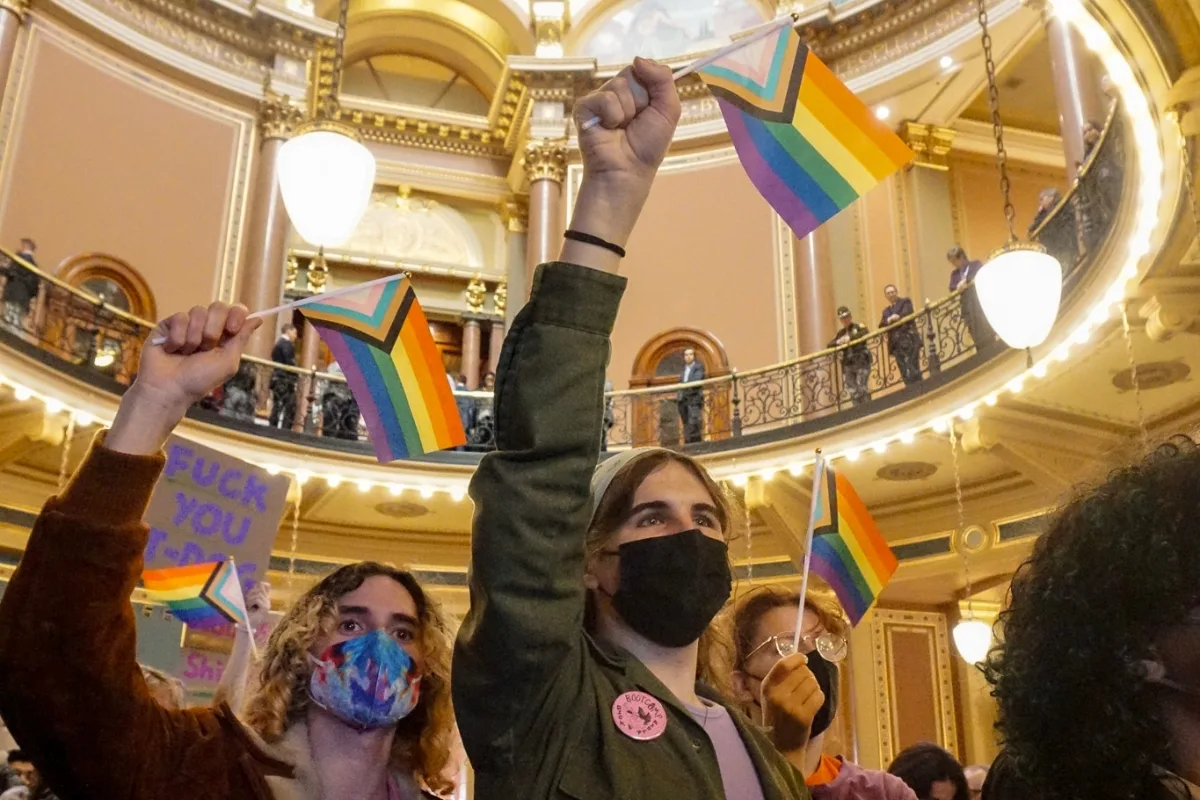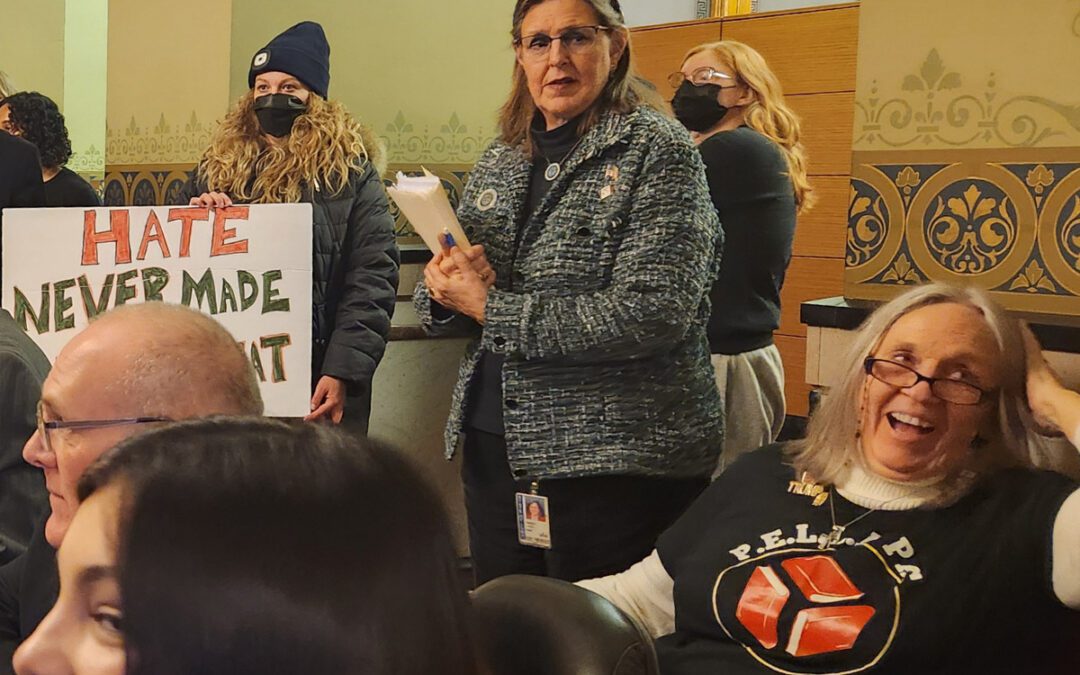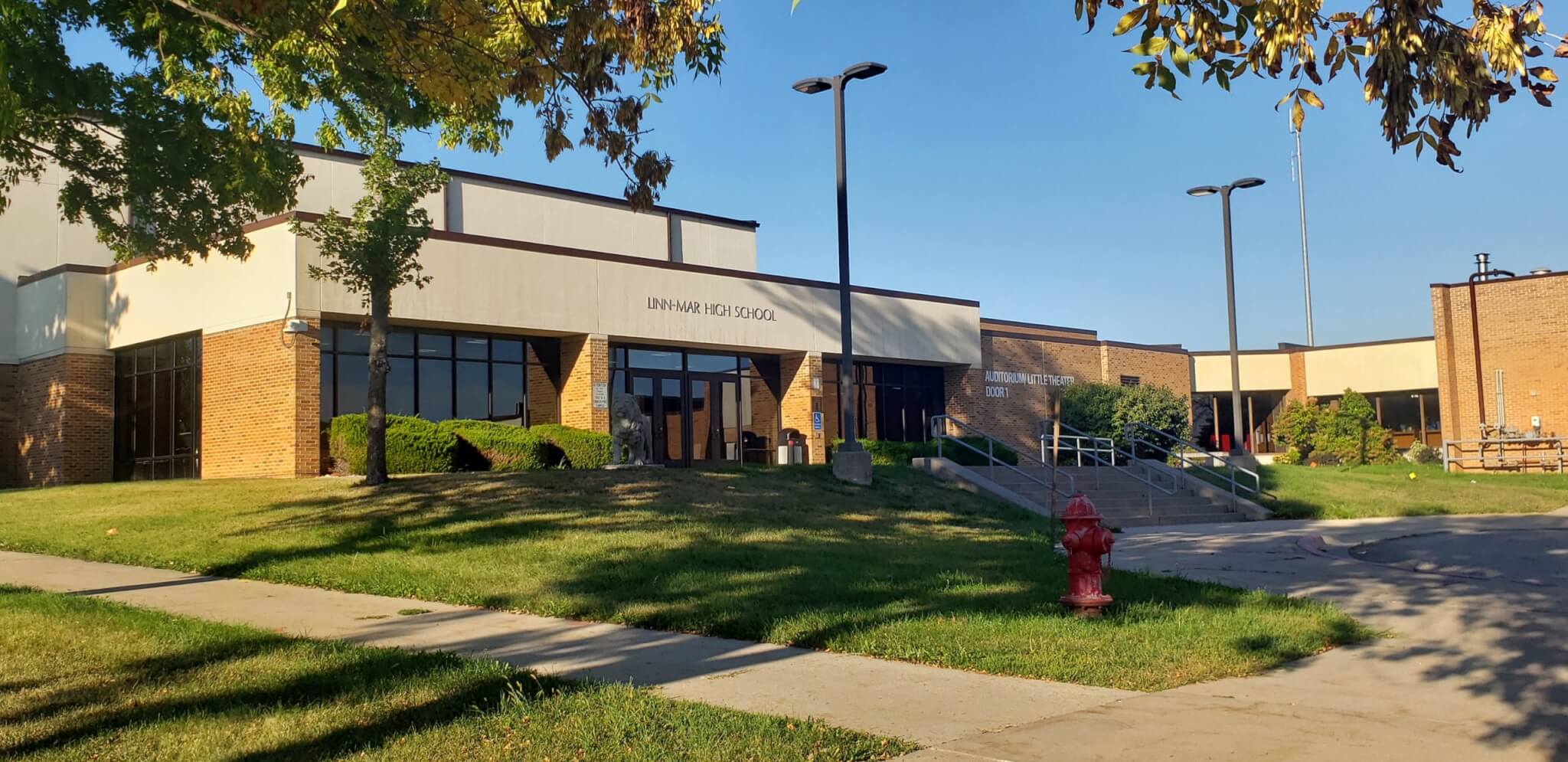
LGBTQ advocates rally at the Iowa Capitol to protest a bill that would legalize discrimination against trans Iowans. The bill failed. Photo by Avery Staker/Starting Line
A new Iowa law removing the civil rights of transgender Iowans goes into effect today. Hear from some of the Iowans targeted by the bill.
Iowa made history today as the first state to actively remove a previously protected class from its civil rights law, targeting transgender residents through a combination of legislative actions that eliminate workplace, housing, and healthcare protections.
During its consideration, hundreds of protesters gathered at the Iowa Capitol to oppose the legislation. Civil rights organizations like One Iowa condemned the measures as discriminatory.
The bill goes into effect July 1, just one day after LGBTQ Pride Month ends.
The law, Senate File 418, removes gender identity protections from the Iowa Civil Rights Act entirely—protections adopted in 2007. It was passed during a break-neck series across seven days where Iowa Republicans managed to introduce and pass it all within a week: faster and before any other bill that session.
In addition to altering the Civil Rights Act, it strategically redefines core legal terms, limiting “gender” to mean only “female or male sex” based on reproductive systems and declaring that “separate accommodations are not inherently unequal.” It prohibits changing sex designations on birth certificates following gender-affirming medical treatment. And it adds restrictions for so-called “gender theory” in schools, which it defines as concepts involving gender identity.
“The legislature’s decision to remove this protection and the Iowa Governor’s decision to sign that discriminatory bill into law was cruel. That is because they did so specifically to allow discrimination—including by the state of Iowa itself—against transgender people, a very small minority of people in Iowa,” ACLU of Iowa Legal Director Rita Bettis Austen wrote in a statement.
The legislation works alongside House File 1049, which prohibits Iowa Medicaid from covering gender-affirming medical treatments. The Iowa Supreme Court had unanimously ruled in 2019 that denying Medicaid coverage for gender-affirming care violated state civil rights protections, but the new laws eliminate the legal foundation for such challenges. Republican lawmakers defended the restrictions as protecting taxpayer funds.
Iowa ranks fourth nationally in out-migration of college-educated residents. And while large employers were quiet about the passage of the bill this year, previous attempts to go after LGBTQ rights in the states had solicited warnings that the legislation makes attracting skilled workers more difficult. Cross-border healthcare activity represents additional economic losses as Iowans seek services elsewhere.
The laws take effect July 1, 2025, positioning Iowa among only 11 states explicitly excluding transgender healthcare from Medicaid while being uniquely the only state to remove established civil rights protections. Legal challenges are expected but face higher hurdles without state civil rights law as a foundation.
The legislation affects approximately 8,000-15,000 transgender Iowans directly while establishing precedents that could impact civil rights protections for all residents, fundamentally altering Iowa’s approach to inclusion and economic competitiveness in a changing national landscape.
We wanted to hear from trans Iowans and you responded…
The law changes impact a small minority in the state. Iowa Starting Line collected a few stories from trans Iowans living here. Iowans who wonder whether they’ll stay in state that has targeted them with legislation. These are their stories.
Ysandril Morrigan of Pleasant Hill is married with a 12-year-old daughter. She moved to Iowa from the Washington, DC, area in 2012, pre-transition, to what she assumed would be a progressive state; at that time, same-sex marriage was legal here, but not nationwide.
“The stereotype was: Move to the midwest, raise a family, have a nice, calm, relaxing life where you feel supported,” she said. “And then 2018 I came out as me, and then 2019 we saw when … [Gov.] Reynolds took over. Everything just started going right down the drain, and ever since then it’s like watching some sort of twisted nightmare.”
When the Iowa Legislature passed a law (later struck down in the courts) outlawing those on Medicaid from getting gender confirmation surgery—something Morrigan was in the process of—it spurred her into advocacy, which hasn’t stopped.
“It just keeps getting worse, and it’s confusing as all hell,” she said. “We’re less than 1% of the population. Why are we so horrible? Why are we so targeted when all we wanna do is exist and pee? … We’re swimming in a sea of blood, and that sea of blood wants to consume us.”
To keep herself from drowning, Morrigan says it’s important to be informed: Look for reliable sources of information, including from the queer community and organizations in the state, and take action for yourself and others.
“The biggest thing these oligarchs and these fascists want to do is scare the fuck out of you,” she said. “They want to make you scared and paralyzed and powerless. Do not let them. … There’s always a way to get to where you need to be.”
Maliah Kome, 28, was born and raised in Burlington, lived in Marshalltown, and recently moved with their partner to Des Moines. They said they’ve “always known” they felt different, but were finally able to consider whether they were nonbinary—neither fully female nor male—in adulthood. Gender confirmation surgery was key to that.
“Life after has just been incredible. I can look in the mirror and be like, ‘That is me,'” Kome said. “My family and my partner after the fact have said, ‘It just suits you. You look more comfortable.'”
But Kome’s personal triumph is happening as trans Iowans and Americans at large are seeing their rights being eroded.
“I remember Iowa being one of the pioneers when it came to legalizing gay marriage,” Kome said. “Seeing the complete 180, being the first state to remove us from civil rights protections … I’m just very disheartened and completely without words to explain how horrible it is.”
Kome said they’ve worked through their grief around it and thrown themselves into advocacy. And while they say they’re ready to stay and fight, they understand why others choose to leave.
“My friends who are ‘more visibly transgender’ I’ve been really worried about,” Kome said, noting a few have moved to the coasts or Minnesota. “They just don’t feel safe anymore, and I understand that. … My partner and I have had to have discussions around, what is the point at which we say, ‘OK, we need to leave Iowa?’ And that could be rapidly approaching at this point.”
Jess Bierling, 50, is easy to find on the race course. Big unicorn horn handband. A bigger smile. And hanging by her side, Izzy.
“ Izzy brings a smile to other people,” Bierling said gesturing to stuffed unicorn.
In her rainbow skirt and “Here to stay” shirt, you can find her braving Ironman Triathlons: grueling test of endurance consisting of a 2.4-mile swim, a 112-mile bicycle ride, and a marathon (26.2 miles). She says Izzy’s part of how she manages the races. Seeing it brings something out of the other athletes.
“So I have someone to talk to and just get me through those tough moments so I can just reach down and just, and you feel a soft friend,” she said. It’s part of her process for runs. And finding comfort in tough times is becoming increasingly important in the state.
Bierling moved to Iowa to go to Drake University, and she stuck around, enjoying the growth and affordability of the city during the 90s. In 2010, she began her transition and has remained here ever since. But these days, she’s getting used to going to the Capitol every year.
“It’s unsettling to say the least,” she said. “ That is not the Iowa that I know. That’s not the city or state that I know. And its disappointing that the Legislature and Governor believe that’s what’s making life better for Iowans. Because I can tell you, it’s not.”
Aria Huizenga (she/her), a South Dakota native, moved to Iowa pre-transition after a Twitter poll suggested it was a good place to live. A lifelong musician, she found a vibrant community through the Des Moines Gay Men’s chorus.
It was with the chorus that Huizenga first started experimenting with her pronouns and gender.
“When I first joined the Des Moines Gay Men’s chorus was the first time I used anything other than he/him on my application,” she said. “I cried at the thought that I didn’t have to fit into this box that I really didn’t enjoy.”
Before then, she said life was gray and muted. She met several trans folks through the chorus that showed her how life could be more colorful, taking her shopping and helping her learn how to do hair and makeup.
Now, she says her life is much more vibrant. She does drag as Tessa Tura, competing in local pageants and performing at community events.
“All of this came here in Iowa. Would I have been trans in South Dakota? Yes, but would it have been this fun, this safe, the space that I had? Not a chance in hell,” she said.
Aria became the Des Moines Gay Men’s chorus main recruiter, and eventually used her role to develop the choir’s all-trans ensemble,Transcendent. It’s one of 12 in the whole country, and Aria believes it’s the second largest.
Leaders of LGBTQ+ choruses around the country have reached out to Huizenga about working with and developing their own trans ensembles, including Palm Springs, New York City, San Francisco, and Los Angeles.
She has taken her love of transness and music to a national stage, the latter of which entirely grew in Iowa. Her identity is forever linked to this state, and she said a legislature can’t take that away.
“I don’t want to leave,” she said. “This is where I became who I am. This is where I want to help everyone else be able to find out who they are.”
Support Our Cause
Thank you for taking the time to read our work. Before you go, we hope you'll consider supporting our values-driven journalism, which has always strived to make clear what's really at stake for Iowans and our future.
Since day one, our goal here at Iowa Starting Line has always been to empower people across the state with fact-based news and information. We believe that when people are armed with knowledge about what's happening in their local, state, and federal governments—including who is working on their behalf and who is actively trying to block efforts aimed at improving the daily lives of Iowan families—they will be inspired to become civically engaged.


Iowa Republicans advance law that could expose drag performances to obscenity lawsuits
Republicans are pushing to open obscenity laws in hopes of making it easier to sue drag performers. Senate File 116, a bill that follows long-time...

Students: ISU LGBTQ Center turned into ‘generic study lab’ by IA Republicans’ DEI law
Iowa Republicans' decision to restrict DEI programs means the loss of one university's LGBTQ+ center, where students have found friendship and...

Attack on LGBTQ+ student group enabled by Iowa’s anti-LGBTQ+ bills
Linn-Mar's LGBTQ+ student group was attacked at the school's homecoming parade. Here's why the Iowa Legislature is on the hook. What do you remember...

Iowa AG defends other states discriminating against trans athletes
Iowa Attorney General Brenna Bird has now joined a group of states to defend laws discriminating against transgender athletes in Idaho and West...

Here’s why Iowa students won’t have new Title IX protections
Iowa students, including transgender and nonbinary children, will not enjoy new federal Title IX protections at school because Iowa Attorney General...

Celebrate Pride Month with these must-read books
We asked our colleagues across Courier Newsroom to share recommendations for books by LGBTQ+ authors. Here’s what they said. Reading allows us to...







